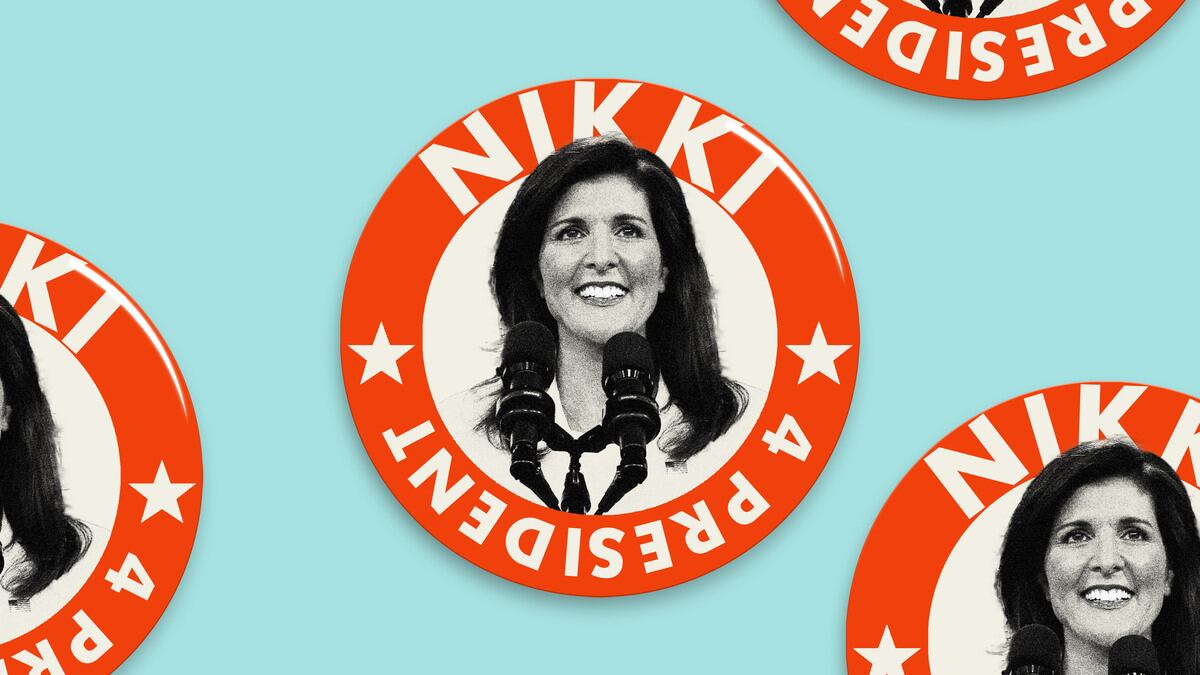Former South Carolina Governor and United Nations Ambassador Nikki Haley seems to be knowledgeable, competent, and personally pleasant. But who, precisely, wants her to be president? Who’s a Nikki Haley voter in 2024?
The anachronistic feel of Haley’s campaign for the GOP nomination has been widely noted since its official launch on Tuesday. She’s “the perfect Republican presidential candidate (for 2015),” wrote Sarah Longwell, publisher of the never-Trump site, The Bulwark. She’s the candidate Republicans would choose if they’d absorbed any of the conclusions of the party’s 2013 autopsy of its loss a year earlier, argued Damon Linker, an observer of the American right (and my former colleague at The Week). And at The New York Times, Modern Age editor Daniel McCarthy pushed Haley all the way back to the George W. Bush years: She’s “the running mate they wish John McCain had,” he said, “in 2008.”
But this broad sense that Haley is chronologically out of step with her party, the victim of a Rip Van Winkle draught or a Thanos snap, isn’t her campaign’s only weakness. In one detail after another, it’s hard to see what constituency she expects to claim among the Republican base of 2024.
Consider, for instance, Haley’s inevitable positioning as the foreign policy knower of this cycle’s primary field. Her two years as former President Donald Trump’s envoy to the U.N. was widely understood as preparation for a presidential run—a source of foreign affairs experience to complement her domestic and administrative record from her two terms in Columbia.
At the U.N., Haley “emerged as the security blanket that [establishment] Republicans and even some Democrats—not to mention America’s allies—[could] cling to when trying to grasp where the Trump administration stands on global affairs,” a Politico Magazine profile summarized in 2017. She’s “not only pro-America, pro-Israel, and tough on terrorism—she’s also wary of Russia and attuned to human rights concerns. It’s pretty much traditional Republicanism, with a glint of neoconservatism.”
But traditional Republican foreign policy with a glint of neoconservatism will hardly be in short supply in the 2024 field, and Haley’s foreign policy experience won’t be unique. Former Vice President Mike Pence, former Secretary of State Mike Pompeo, and former National Security Adviser John Bolton are all considered likely candidates. Even Florida Gov. Ron DeSantis (R) has a more robust foreign policy record than many realize thanks to his years in the House.
And if Haley does want to run on her foreign policy chops, she picked perhaps the single worst way to build her record—Republicans don’t like the United Nations. On this point, the modern, pre-Trump, and Bush-era GOPs agree. Why would Republican primary voters flock to a candidate who spent two years working within an institution they believe constrains American sovereignty and saps American power?
On race, gerontocracy, and electoral victories—three topics Haley prioritized in her launch video Tuesday and first campaign speech Wednesday—she seems either similarly oblivious to the reality of the current GOP base or astonishingly confident in her own ability to persuade Republican voters to take their medicine. And it is medicine, after all, that Haley is offering on each point, compared to what Trump and culture warriors like DeSantis and Pompeo will present.
The middle-way messaging on race with which her video begins, her suggestion that 75 may be too old for the serious work of governance, and her acknowledgement that Republicans “lost the popular vote in seven of the last eight presidential elections”—what led Haley to believe this is what her party’s primary voters want? Maybe it’s what they should want, but the last eight years haven’t exactly trained Republicans’ tastes in this direction. Even the least controversial of the trio, the gerontocracy point, seems risky in a party where most registered voters are over 50 and the most active voters are over 65.
Haley’s faith, too, may be a sticking point for some Republicans, even if they aren’t eager to say so. This is difficult to predict after Trump’s success despite his obvious unfamiliarity with the most basic tenets of Christianity. But Trump, not to put too fine a point on it, is an elderly white man who can claim a family history of Presbyterianism.
Haley doesn’t have the same luxury. Her parents are Sikh, and her account of her conversion to Christianity, at least as told to The New York Times in 2012, is vague and mostly concerned with her childhood disinterest in learning Punjabi, which meant she didn’t “read Indian scriptures [until] we could get the English versions.” In a conversation with Christianity Today (where I have a column) the same year, Haley didn’t pinpoint a moment of conversion and seemed to profess ignorance of the meaning of “evangelical” and “born-again.” That may matter in a race with Trump and Ron “God made a fighter” DeSantis.
These incongruities with the GOP base are enough to make Haley’s campaign most plausible as a veepstakes shot, not least if Republican strategists want a demographic balance which mirrors the Biden-Harris ticket. And particularly if she lands in that role, Haley will be endlessly compared to Vice President Kamala Harris on superficial grounds of similar age, family background, and national profile. But their biggest similarity is arguably the lack of enthusiasm for each within their respective parties.
It’s too early to make confident predictions about this election—remember conventional wisdom at this point in 2015?—but seriously: Who’s a Nikki Haley voter in 2024?








